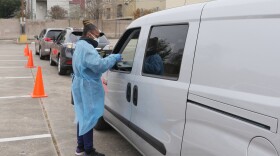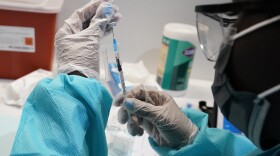
Joe Neel
Joe Neel is NPR's deputy senior supervising editor and a correspondent on the Science Desk.
As a leader of NPR's award-winning health and science team, Neel directs coverage of breaking news in health and science, ranging from disease outbreaks and advances in medical research to debates over health reform and public health.
Joe also plays a key role in overseeing the Science Desk's award-winning enterprise reporting. Among his current projects and responsibilities, Neel supervises the Monday "Your Health" segment on Morning Edition. He also directs several ongoing editorial partnerships. One, a partnership with Kaiser Health News and public radio member stations, focuses on health care in the United States. Another is a polling project on health issues with the Harvard T. H. Chan School of Public Health and the Robert Wood Johnson Foundation.
Neel has played a key role in expanding the network's coverage of global health and development issues. He is currently focused on domestic health issues, including cutting-edge biomedical research and developments in the health industry, such as the Affordable Care Act.
In 2008, he launched NPR's "Your Health" podcast and helped launch and grow "Shots," NPR's health blog, in 2010.
In addition to his responsibilities at NPR's Science Desk, Neel also regularly serves as newsroom manager, overseeing the network's overall news coverage.
During his tenure as editor, NPR's health reporters and correspondents have won numerous awards, including the George Foster Peabody Award, the National Academy of Sciences Communication Award, the Sigma Delta Chi Award from the Society for Professional Journalists, the Everett McKinley Dirksen Award for Distinguished Reporting on Congress, the American Association for the Advancement of Science's Journalism Prize, and the Association of Health Care Journalism award. Neel was awarded the prestigious Kaiser Family Foundation Media Fellowship in 2007.
Neel started filing stories about medicine and health as a freelancer for NPR in 1994 and joined the staff two years later.
He earned bachelor degrees from Washington University in St. Louis in both biology and German literature and language. He also studied biology at the Universitaet Tuebingen in Germany.
-
Abbott says the information that he provided at a press conference two days ago was a recitation of what law enforcement had told him in a room beforehand.
-
So many people caught the omicron variant over the winter that almost 60% of everyone in the U.S. — including most children — now have antibodies to the virus in their blood, the CDC said Tuesday.
-
After some debate, a group of scientists advising the FDA concluded that the vaccine's benefits outweigh its risks for young children.
-
Many families are under financial stress, parents see kids seriously behind in school, huge rent bills and looming evictions and delayed medical care has negative consequences, to name a few.
-
The leaders of two federal health agencies are telling White House COVID-19 advisers that there is not enough data right now to make a blanket recommendation on boosters.
-
The CDC information dated Thursday gives new details on this variant of the coronavirus and says the agency should "acknowledge that the war has changed." It was first reported by The Washington Post.
-
Health officials once advised going into quarantine and being tested for the coronavirus if you were near an infected person for 15 minutes. Now the rule is a total of 15 minutes in a 24-hour period.
-
The test has been promoted by the Trump administration as a key factor in controlling the epidemic in the U.S. and is used for daily testing at the White House.
-
In a study of the early coronavirus epidemic in the U.S., a third of people who were hospitalized were African American. Top risk factors were high blood pressure and obesity.
-
The U.S. with about 82,000 cases passed China with about 81,000. The cases being detected in the U.S. have risen as more tests have become available, although the wait for tests can still be long.
-
Dr. Deborah Birx said she had a "low-grade fever" Saturday and tested negative for coronavirus. But her symptoms don't line up with what the government is advising for who should get a test.
-
Watch as experts on income inequality discuss a recent NPR poll that is notable for capturing the views of the top 1% of earners in America. The webcast will be livestreamed at 12 p.m. ET Monday.











